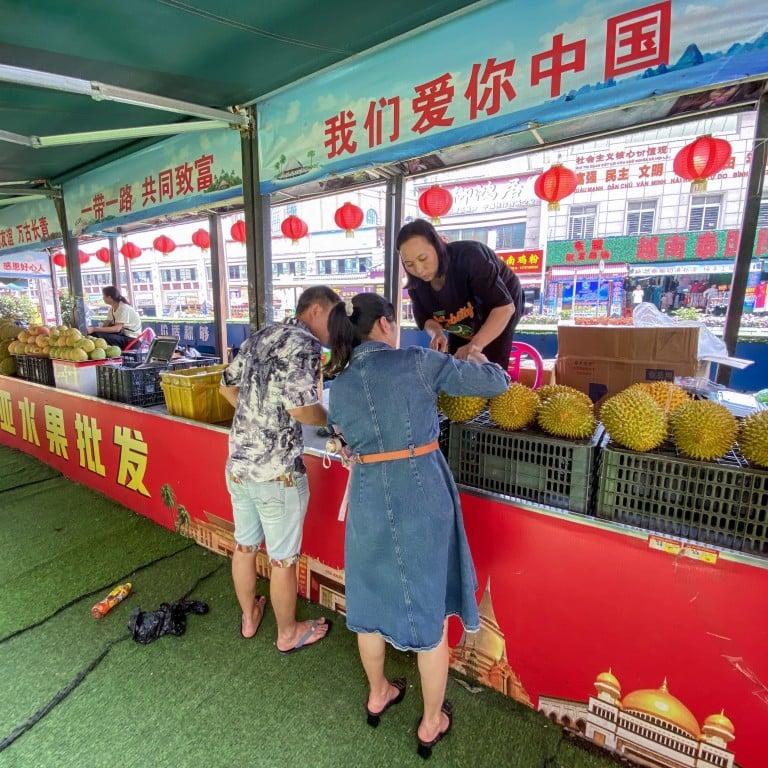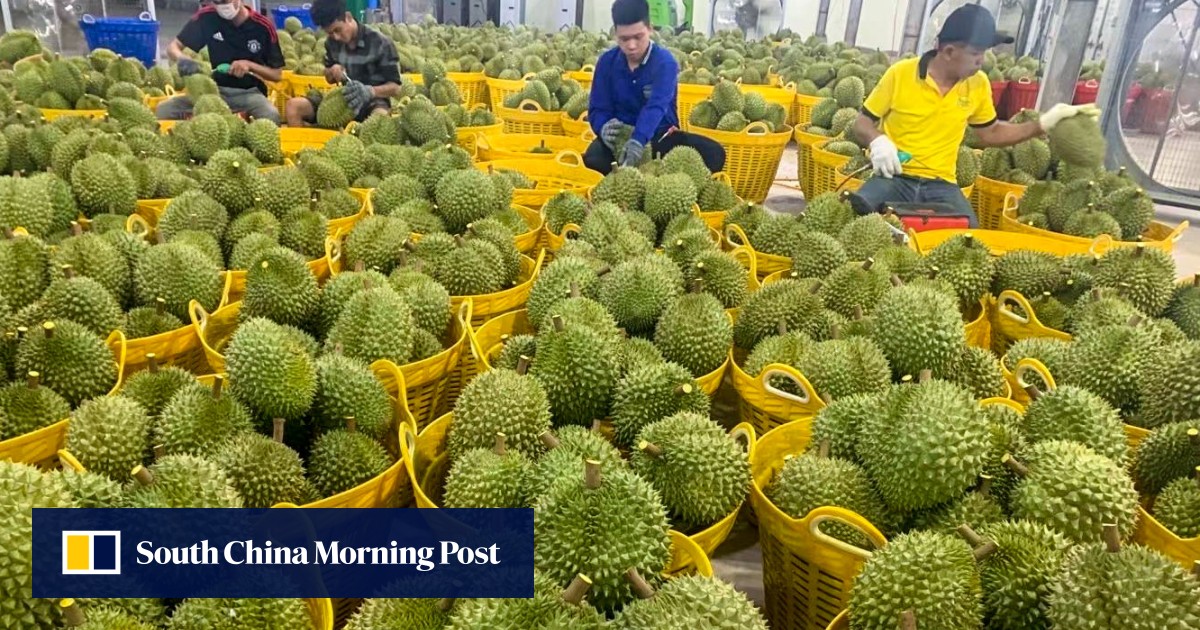Viet
ELITE MEMBER

- Joined
- Jun 18, 2012
- Messages
- 29,950
- Reaction score
- 0
- Country
- Location

Global Economy
- Vietnam exported over 95 per cent of its US$876 million of durian to China in the first half of the year, according to Vietnamese media reports
- Durian has become one of the most favoured tropical fruits for China’s middle class, with Thailand exporting 99 per cent of Southeast Asian durians
Vietnam is increasing durian exports to China by using land-border shipments to control costs, a strategy that may challenge Thailand’s dominance in the market.
Cross-border shipments have surged since China formalised regular shipments of the popular, uniquely pungent fresh fruits from Vietnam a year ago.
In the first half of 2023, Vietnam exported durian worth US$876 million, with US$835 million shipped to China, Vietnamese media reports said.
Trucking durians across the 1,306km (812-mile) land border will save money that should be reflected in retail prices, said Jack Nguyen, a partner at business advisory firm Mazars in Ho Chi Minh City.
“They would have the advantage of volume and feasibility of transport,” Jack Nguyen said. “For sure, they’re competitive on price.”
The market potential for Vietnamese durian shipped by land has already prompted border cities in China to improve trade logistics.
China pledged to make border transport easier in January 2022, the month when the Regional Comprehensive Economic Partnership trade agreement took effect.
The 15-nation free-trade deal, which involves the 10-member Association of Southeast Asian Nations bloc plus China, Japan, South Korea, Australia and New Zealand, has accelerated the durian trade due to lower taxes and streamlined customs procedures.
Durian has become one of the most favoured tropical fruits for the middle class in China, with consumers in some regions offering it as a high-end gift to newlyweds and future mothers-in-law.
But its own durian crop is relatively small, and new, compared to neighbouring Southeast Asia.
Top-grade Vietnamese durian sells for around US$4 per kilogram in China, according to the VnExpress International media outlet in Vietnam.
Durian from other Southeast Asian nations sell for US$10 or more per kilogram, HSBC said earlier this month.
Thailand exports 99 per cent of Southeast Asian durians, HSBC said, with global demand having grown by 400 per cent year-on-year in the first quarter of 2023 because of demand from China.
Durian from Thailand is known for its sweet flavour, but the land-sea shipping route to China takes a minimum of four days.
Farmers in Vietnam’s chief growing zones in the southern provinces and Central Highlands are eager to comply with China’s 76 origin codes required for cultivation and 25 for packaging durian imports, analysts said.
China was previously worried about pesticides and fertilisers, said Nguyen Thanh Trung, director of the Saigon Centre for International Studies at the University of Social Sciences and Humanities in Ho Chi Minh City.
Vietnamese farmers had addressed pesticide and fertiliser problems by September last year.
“It means they are trying to accelerate exports for now,” said Nguyen Thanh Trung, who estimated that 100 Vietnamese farmers have export permits for China.
Because durians are usually planted in hot, humid climates, they are susceptible to “pests and diseases”, agriculture-use drone developer XAG said in April.
Durians need “spraying and fertilisation” throughout the growth cycle, a process that “can be heavy in labour and fertiliser,” the statement said.
China’s General Administration of Customs requires Vietnamese growers and exporters to first register with Vietnam’s Ministry of Agriculture and Rural Development, the state-run Viet Nam News reported.
It wants farmers to practise “quality management” and meet “sanitary requirements”, meaning durians must reach a maturity rate of 80 per cent upon harvesting, be of almost identical weight and quality and be properly refrigerated.
Durian is grown on 110,300 hectares (272,557 acres) in Vietnam, up from 37,000 hectares in 2017, VnExpress International said.
“They get up to speed pretty quickly on these things,” said Frederick Burke, a Ho Chi Minh City-based senior adviser with law firm Baker McKenzie. “Farmers will say, ‘Yeah, China, let’s go for it.’”
Agriculture is leading other export categories this year because of China-bound durian, said Ralf Matthaes, founder of Infocus Mekong Research consultancy in Ho Chi Minh City.
It is in turn leading other export categories from the country that is better known for its manufactured goods, he added.
But Vietnamese officials hope to eventually avoid over-reliance on the Chinese market in case other problems disrupt trade, analysts said.
China and Vietnam dispute sovereignty over tracts of the South China Sea, leading to periodic maritime standoffs.
The visit by US President Joe Biden to Vietnam this week could also rile Beijing if the “two sides strengthen their strategic ties” to resist China’s role in Asia, said Alexander Vuving, a professor at the Daniel K. Inouye Asia-Pacific Centre for Security Studies in Hawaii.
Chinese authorities stopped thousands of Vietnamese trucks at the border for weeks in December 2021 and again in March 2022 due to coronavirus restrictions.
“China now has the power of buying,” Nguyen Thanh Trung said. “They’re the biggest buyer in the world. So that’s the reason we worry about over-reliance.”

Durian dominance: Vietnam’s secret weapon vs Thailand in battle for China
Vietnam exported over 95 per cent of its US$876 million of durian to China in the first half of 2023, helped by lower taxes and streamlined customs under the Regional Comprehensive Economic Partnership free-trade deal.
